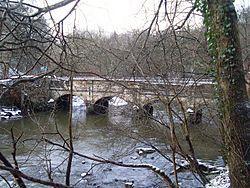Dawsholm Park facts for kids
Quick facts for kids Dawsholm Park |
|
|---|---|

Stone bridge crossing the River Kelvin in Dawsholm Park
|
|
| Type | Local Nature Reserve |
| Location | Glasgow, Scotland |
| Area | 33 ha (81.5 acres) |
| Created | 1922 |
| Operated by | Glasgow City Council |
| Open | All year |
Dawsholm Park is a lovely public park located in Glasgow, Scotland. It sits right next to the areas of Kelvindale, Maryhill, and Temple. You can also find it near the southern parts of the town of Bearsden. The park is special because it's right on the River Kelvin, which flows north of the bigger River Clyde.
This park is quite large, covering about 33 hectares (that's about 81.5 acres!). Most of Dawsholm Park is covered in beautiful woodland. But you'll also find some open grassy areas and pretty wildflower meadows, especially in the southeast part of the park. It's a great place to explore nature and enjoy the outdoors!
Discovering Dawsholm Park
Dawsholm Park is a fantastic place for everyone to enjoy. It offers a mix of quiet woodlands and open spaces. You can explore the paths, watch for wildlife, or simply relax. The park is managed to keep its natural beauty.
A Park with History
Dawsholm Park wasn't always a public park. It was created from land that the Glasgow City Council bought in 1922. They purchased this land from a person named Sir Archibald Campbell of Succoth. The park's woodland area was originally known as the Belvidere plantation.
The Council also bought some grassy areas next to the woodland. Sir Archibald then gave them another piece of land. This land had some waste from oil shale production. The Council worked hard to clean up this area. They leveled it and planted grass. This turned it into a fun recreation spot with football pitches.
Nature's Classroom
The woodland part of Dawsholm Park has always been kept very natural. This means it's a great place for plants and animals to thrive. In 2007, the Glasgow City Council officially named Dawsholm Park a Local Nature Reserve. This special title helps protect the park's natural environment.
As part of keeping the park healthy, something cool is happening! Highland cattle are being used in a special program. This is called managed grazing. These friendly cows help keep the grassy areas tidy. They eat certain plants, which helps other wildflowers grow. This makes the meadows even more beautiful and helps nature.
What's Around the Park?
Dawsholm Park is surrounded by some interesting places. Right next to the park, you'll find the University of Glasgow School of Veterinary Medicine. This is where students learn to become animal doctors! There are also the university's sports facilities, called the Garscube Complex.
Another neighbor is the West of Scotland Science Park. This is a place where scientists and researchers work on new discoveries. Finally, one of Glasgow's main waste recycling centers is nearby. This center helps the city recycle materials from the northwest area.
 | Roy Wilkins |
 | John Lewis |
 | Linda Carol Brown |

